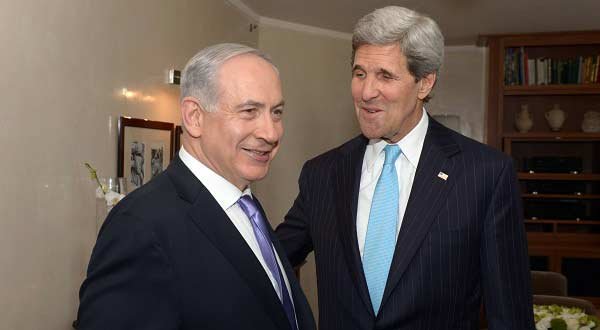
PALESTINIANS REMAIN LUKEWARM TO WASHINGTON’S LATEST MOVES ON THE ‘PEACE PROCESS’
JERUSALEM, Dec 9 – Israeli Economy Minister Naftali Bennett has proposed that Israel annex parts of the West Bank under its full military control where most Jewish settlers live.
“I favor implementation of Israeli sovereignty over the zone where 400,000 (settlers) live and only 70,000 Arabs,” said the head of the far-right Jewish Home religious party in the ruling coalition. The Finance Ministry, meanwhile, has decided to allocate an extra $26 million to build settler homes in the Palestinian territory rather than implement cuts as earlier planned, according to the website of Israel’s private Channel 10 television.
The Palestinians have long viewed the construction of Jewish settlements on land they see as part of their future state as among the biggest obstacles to resolving their decades-old conflict with Israel. Bennett also ridiculed the US-brokered peace talks between Israel and Palestinian President Mahmoud Abbas, whose writ covers the West Bank but not Gaza, ruled by the Islamist movement Hamas. “This is all a joke. It’s as if we’re discussing the purchase of a car with only half of its owners,” he told public radio.
In another negative Israeli assessment of the peace process, Defense Minister Moshe Yaalon said on Saturday: “There is no partner on the Palestinian side to reach a two-state solution for two peoples.”
Their views contrasted with a statement by US Secretary of State John Kerry on Friday at the end of his latest mission to Israel and the Palestinian territories. “I believe we are closer than we have been in years to bringing about the peace and the prosperity and the security that all of the people of this region deserve,” Kerry told reporters.
Direct negotiations were launched in late July but have made little apparent progress as they approach the half-way mark of a targeted nine months.
Call for Historic Peace
Meanwhile Netanyahu’s main coalition partner publicly prodded him on Sunday to show “historic courage” and reach a peace deal with the Palestinians even at the risk of his government’s collapse.
Finance Minister Yair Lapid, in a speech, reassured Netanyahu of his centrist Yesh Atid party’s support and spoke of possible changes in the coalition – a nod to any future exit of far-right factions and their replacement by left-wing partners – should a land-for-peace agreement be achieved. “I’m determined to do everything within my power to ensure that this government stays the course – even if developments in the peace negotiations necessitate a coalition realignment of one kind or another,” Lapid said.
But he also appeared to issue a warning to Netanyahu, reiterating that Yesh Atid, which has 19 legislators in the 120-member parliament and is the second-biggest party in the coalition, would not remain in a government that did not genuinely pursue a negotiated settlement. “I am not ready to have Yesh Atid serve as a fig leaf for pointless political manoeuvring,” Lapid told an economic conference.
Speaking two days after meeting Kerry, Lapid gave no indication that US-brokered peace talks, which began in July with a nine-month timeframe for success, were making progress. But he said that accepting a narrative, voiced by opponents of a deal on both sides of the conflict, that nothing would come of the negotiations could turn into a self-fulfilling prophesy and destroy chances for an accord.
“We cannot continue pretending that peace does not involve paying a price – a heavy, painful, national and political price that both signatories of the peace agreement will be forced to bear,” Lapid said. “The prime minister has declared that he is aware of this price and of the notion that the only solution on the table is the implementation of the principle of two states for two peoples. I sincerely hope that he exhibits the kind of historic courage required to pay this price,” he said of Netanyahu.
Israeli commentators have suggested in the past few weeks that Lapid was looking to win back disappointed dovish voters who have abandoned Yesh Atid for left-wing opposition parties. In Washington, President Barack Obama said he believed it was possible to reach a framework agreement over the next several months that would not address every detail of the Israeli-Palestinian conflict but could move things forward.
On Thursday, Kerry said he has presented Israel with “some thoughts” about improving its security under any eventual accord on establishing a Palestinian state. Neither side has given details of the US ideas. Israel has long said it would want to keep a military presence between the occupied West Bank and Jordan, as well as swathes of Jewish settlements — enclaves that most of the world deems illegal.
Hanan Ashrawi, a member of the executive committee of the Palestine Liberation Organization, rejected on Sunday what she said was Israel’s demand to control the borders of a future state that Palestinians seek in the West Bank and Gaza Strip. “It means that Israel does not want a peaceful solution and does not want to abide by the international law and the peace obligations and is making impossible conditions,” she told Voice of Palestine radio.–IINA

